This is a guest post from Diva Harsoor with photography by Chris Dembia, about organizing a conference for people to share their experience, best practices, and dreams for living in community - basically an in-person Supernuclear!
On December 10, 2023 in San Francisco, the inaugural Community Living Wisdom Exchange hosted over 100 community house members, coliving-curious newcomers, and practitioners in relevant fields, all eager to commune, learn, and be inspired. Some even flew in to participate. Meals and childcare were provided, and folks who were unable to join in-person tuned into the livestream.
Attendees of the conference reported a sense of belonging, connection, and awe–how special and rare it was to gather these distributed communities, to grapple together with building new paradigms for wealth, family, and our shared world! Woven throughout was a question, driven half by exhilaration, half by anxiety: how could we realize our communities’ potential and create the world we want to live in?
For this article, I pulled from conversations with organizers, volunteers, and attendees of the conference, as well as my own experience. By detailing how the conference came together, my goal is to provide a blueprint to those who feel called to plan movement-building events, nurturing changemaking potential in their own communities.
The idea
In September 2024, Winter Ku and Kiah Dennerstein went on a retreat for a mutual friend’s 30th birthday, where they discovered their shared zeal for communal living. Winter told Kiah that they “wished there were more ways to share knowledge, to democratize or bring to light all of the hidden nuggets of wisdom that people have stored inside their brains.” With their combined sixteen years of experience organizing in community houses, the pair was well-equipped to tackle the challenge themselves.
Back home in the Bay Area, Kiah brought the notion to their community house, where their housemate Alex Savtchenko leaped at the opportunity to support the effort. Thus, the core organizing team was born.
The process
Setting the vision
The first thing the organizers did was create and distribute a community brainstorming form, relying on the Haight St. Commons network for reach. Kiah advises others organizing community events to approach their work from the beginning as a co-creation, relying on the target population’s networks and playing to its strengths. “None of these events are run just by you,” they said, “even if you’re the one spearheading it.”
Still, the survey didn’t cover everything, and a different format had each organizer’s heart. Winter originally conceived of a cozy get-together. Alex imagined a multi-track conference, with panels, speakers, and name tags. Kiah had visions of a nature retreat, a respite from people’s busy daily scenes: “hanging out in a hot tub, going for a hike”—alongside workshops and discussions.
“We ended up mixing and matching,” said Alex. The organizers bookmarked the retreat for a future project and reconciled the multi-track conference and casual get-together by including an “unconference.” Attendees would be encouraged to add discussion topics to an unconference poster board, as well as indicate their interest in others’ ideas with tally marks. After the panels and workshops were over, the poster board would set the agenda.
Spending Money
Budget & fiscal sponsor
The process of creating a vision is “arguably never really done,” according to Winter. Still, the core organizers had aligned on the idea of a multi-track conference. From there, they estimated a budget with line items for the venue, insurance, food, and supplies. District Commons, a nonprofit that supports Bay Area cooperative living communities, served as the event’s fiscal sponsor, contributing their tax-exempt status and financial management services in exchange for a 10% cut of the revenue.
Tickets
Although tickets provided the sole source of revenue, the organizers wanted to prioritize financial accessibility. Guided by the survey, which had received an encouraging 114 responses, they suggested a $40 donation per ticket but also made it clear that attendees could pay what they pleased. “And if we come short,” said Winter, “that’s on us, and we will do different planning next time.”
Aspiring organizers who are less willing to weather financial loss could fundraise well in advance and build the event’s budget from committed funds instead. But as readers will note later in this article, these organizers' financial strategy proved effective for them.
Meals
On the question of how many meals to provide, the survey was entirely unhelpful–every option was equally popular. The team chose to be generous. Hospitality just felt good. It also didn’t cost much. Snacks, breakfast, and the lunchtime sandwich bar comprised grocery store basics, and a few thoughtful and forward-thinking attendees fortified the spread with substantial offerings. Meanwhile, a beloved community chef catered dinner.

Then came more decisions. How big should the conference be? What atmosphere should the organizers foster? When should they host the conference? And where? Eventually, every answer seemed predicated on one thing: the venue.
Finding Alchemy House
In the search for a venue, the organizers dipped into the community once again, seeking guidance from planners past. There had been a previous wisdom exchange four years before, a single-track series of talks with a different focus, from which this conference took its name. That event’s organizers were generous in sharing their research and connections. Although none of those options panned out, the resources helped the team refine their search criteria. The three organizers evaluated a dozen venues before they found their answer. In true co-op community fashion, the connection was the previous owner of Winter’s mattress.
“They mentioned trying to build community at this space called Alchemy House,” said Winter. “I looked into it. Still early in its existence, lots of work to be done, but it ended up being a really nice venue for us.” Located in Lower Nob Hill, Alchemy House was spacious, with friendly, value-aligned owners, and because of its early stage, quite a deal. There was excitement over the garden sauna, too, which was still under construction.
Speakers, Attendees, and Sealing the Deal
The organizers booked Alchemy House for December 10th, 2023, three months after planning started. Alas, the sauna wouldn’t be ready, but the group was keen to harness the energy coalescing around the Community Living Wisdom Exchange before the holiday season struck.
The next major item on the agenda was putting together a good program. “That was probably the thing that overall took the most amount of time,” said Winter. “Speakers are also busy and [require] cat herding.” And as the event drew closer, the organizers found themselves occupied with last-minute logistics, too: organizing volunteers, transporting food, finding a photographer, and gathering supplies.
While it’s impossible to account for everything, Alex thinks the team could have onboarded non-core volunteers earlier in the process to handle last-minute logistics, freeing up core organizers to focus on key areas, like the program, “instead of playing whack-a-mole three days out.”
Winter, meanwhile, was feeling some creeping worries about attendance. The response to the survey had been so encouraging; yet with the event a week away, no more than 65 people had bought tickets. “It was a little stressful if you ask me,” said Winter.
At last, the program was finalized and released on December 9, 2023, the day before the conference. Almost magically, ticket sales started pouring in.
Ultimately, 143 tickets were sold, with over half being purchased within a week of the event. Attendees counted over a hundred participants at peak attendance and about 45 stayed until the closing ceremony. “It was awesome to see how many people came last minute,” said Kiah.
In a note to future organizers, Winter said, “It’s potentially important to nail down speakers and schedule earlier if you want people to buy tickets earlier.” It was a point the organizers received feedback about from speakers and attendees.
At last, the people were coming, the program was set, the logistics were logisticked. Only one thing remained.
The Day Itself
“It's been really great to see all the people here,” said Annie McShiras, Investment and Fundraising Director of the East Bay Permanent Real Estate Cooperative, who spoke on the panel Structures for Community-Owned Housing. As a professional bringing expertise in strategies of financing collective property, she enjoyed connecting with members of community houses. “It was great to bring these worlds together and have conversations that bridge the divides that can exist between [the two groups].”
Meanwhile, attendee Ray Liu felt a sense of belonging. "[I] sometimes just feel like, Oh, I'm doing something that's kind of weird. But now, here, there are people who have not only lived in these places for so much longer than me, they're starting the places."
Others commented on the panels and focus areas. "It was nice to be part of the baby [panel] and share our experience,” shared Jeeshan Chowdhury, who brought his eight-month-old to the conference. “It's nice to see that people are thinking about families and parents." Other sessions under the parenting umbrella discussed fostering court-dependent youth in community houses and parenting while coliving more broadly.
For aspiring community founder A.K. Sindhu, the panel on housing structures “was so on point for what I needed…so I was grateful to have that knowledge bank available." Would-be founders also appreciated the Demystifying Collective Finances workshop, where participants roleplayed purchasing a fridge together, and the Trials & Tribulations session, which featured discussion on assessing the fit of prospective housemates.
Regarding room for improvement, poor acoustics in the basement coupled with rowdy workshops led to A/V issues, and open doors on a foggy SF day made for a cold congregation. Organizers of future events could address these issues by sound testing the venue prior to the event, as well as considering and communicating with participants about temperature concerns. Still, attendee Esha Reddy reported feeling “very cared for,” with the art table, culinary offerings, and community spirit creating their own warmth.
Participants also had feedback on the structure. Some wanted a higher-level professional conference, with more sessions and a greater emphasis on expert knowledge. Others, like Paul Grasshoff, wanted the opposite. "I really like the unconference stickers area,” said Paul, “and also the free-flowing conversations out in the hallways."
Alex told me that his primary partner, a teacher for many years, was not surprised by the diverging preferences. These results mirrored her teaching evaluations–some people thrive on freedom and flexibility, while others crave structure. The core team discussed a two-day format for a future event, with one day for each group. Future organizers can also consider hosting mingling spaces parallel to workshops and panels and scheduling longer breaks at mealtimes.
Revenue and surplus
"The conference ended up being very financially sustainable,” said Alex. “It cleared costs by a good margin." The surplus indicates that the organizers had more financial runway than anticipated, even with a sliding scale ticket.
Moving forward, organizers may plan to compensate speakers, opening the conference to a broader range of experts and community leaders, as well as themselves, making future energetic investment more sustainable. [side note, I very much applaud compensating organizers so they don’t burn out!]
Into the Future
Kiah is quite happy with how the event turned out; still, they found it crowded and formal. They referenced Aleta Alston Toure, a speaker on the Land Stewardship panel. In Kiah’s words, Toure spoke about how “we keep reproducing colonial ways of communicating and being, even in spaces that we’re trying to decolonialize.”
“I have dreams of a retreat,” Kiah said. “Something a little more grounded.” Regardless of the format, they are enthusiastic to be involved in future iterations of this event.
Alex feels similarly. “It would be great to do a retreat like Kiah wanted. It would be great to keep working with Haight St Commons, Supernuclear, and a few of the organizations we partnered with to keep providing resources. We’ve all been following up with lots of people from the conference.”
“I just want to support a lot more of this sort of thing in general,” said Winter. “The goal is bringing people together, forming connections, building community, as well as sharing ideas, wisdom, inspiration, making it easier for more people to do this kind of thing, live the way they want to live.”
When it comes to future organizing, Winter is excited to contribute but not possessive of the reins. “It would be great if enough other people were excited about it, and they wanted to take the helm or steer the ship or drive it forward.”
While aspiring organizers have much to take away from this story, it’s this attitude that reveals the core organizing team’s chief wisdom. Although Winter, Kiah, and Alex devoted immense personal effort to the project, their key strength lay in harnessing the talents of their community. Each step, from planning to execution, unfolded as a fundamentally collective undertaking. This successful project is just one example of what can happen when coliving communities rally for a grander cause. If more of us tune into organizing potential within collective houses, we can dig deeper, propagate further, and move ever closer to the joyful, connected world of our dreams.
Interested in creating or attending the next Community Living Wisdom Exchange? Let the organizers know! And a few further links:


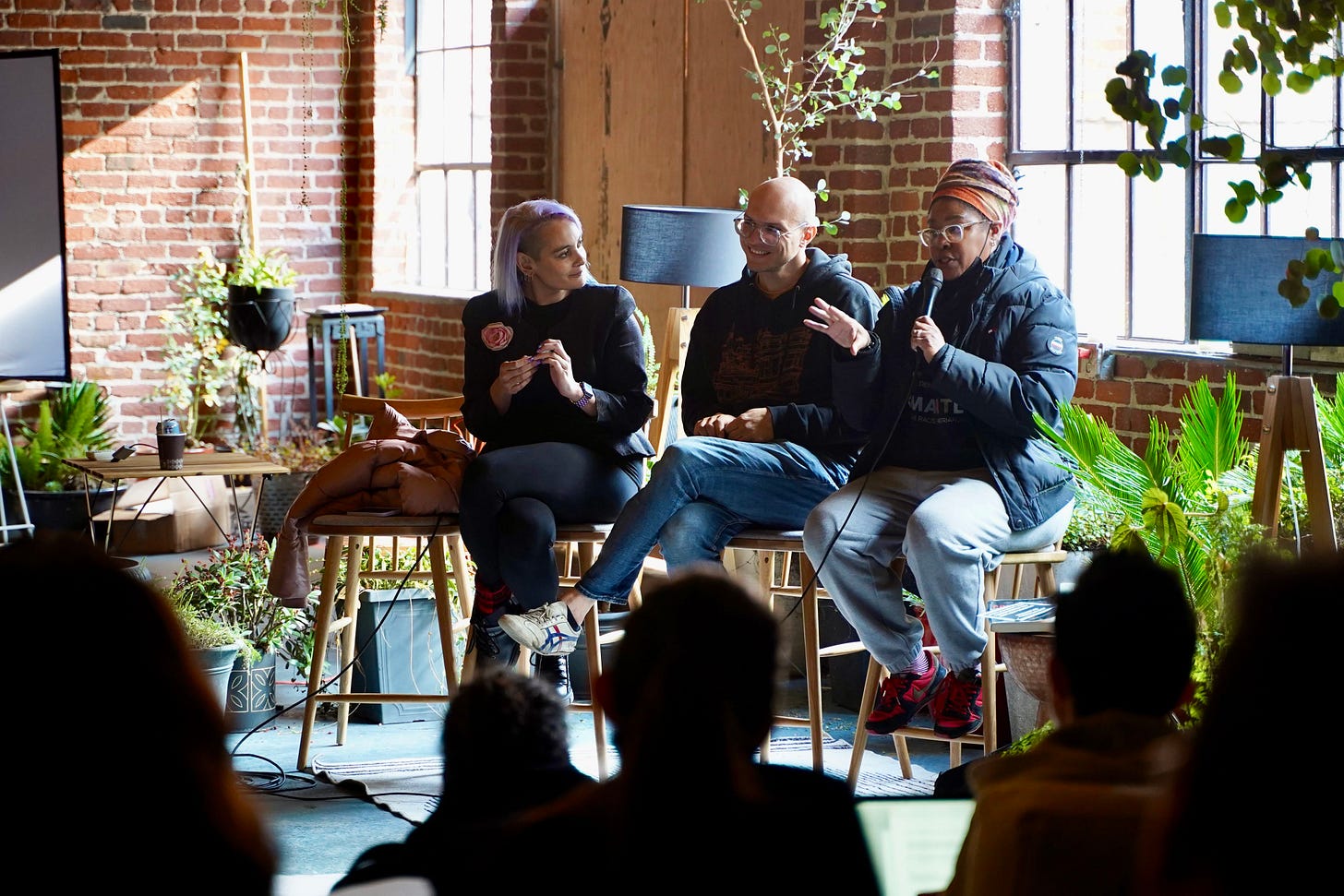
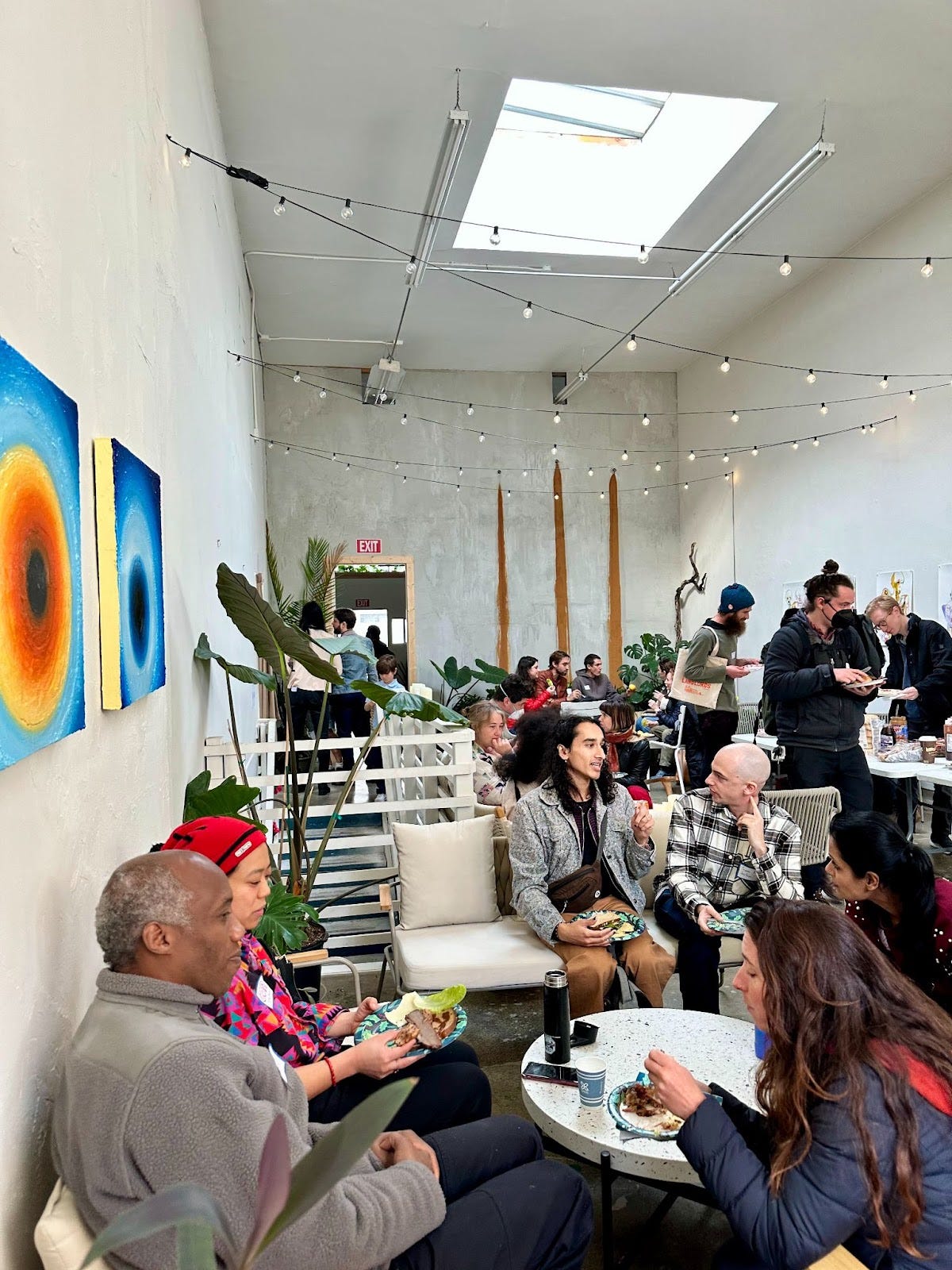


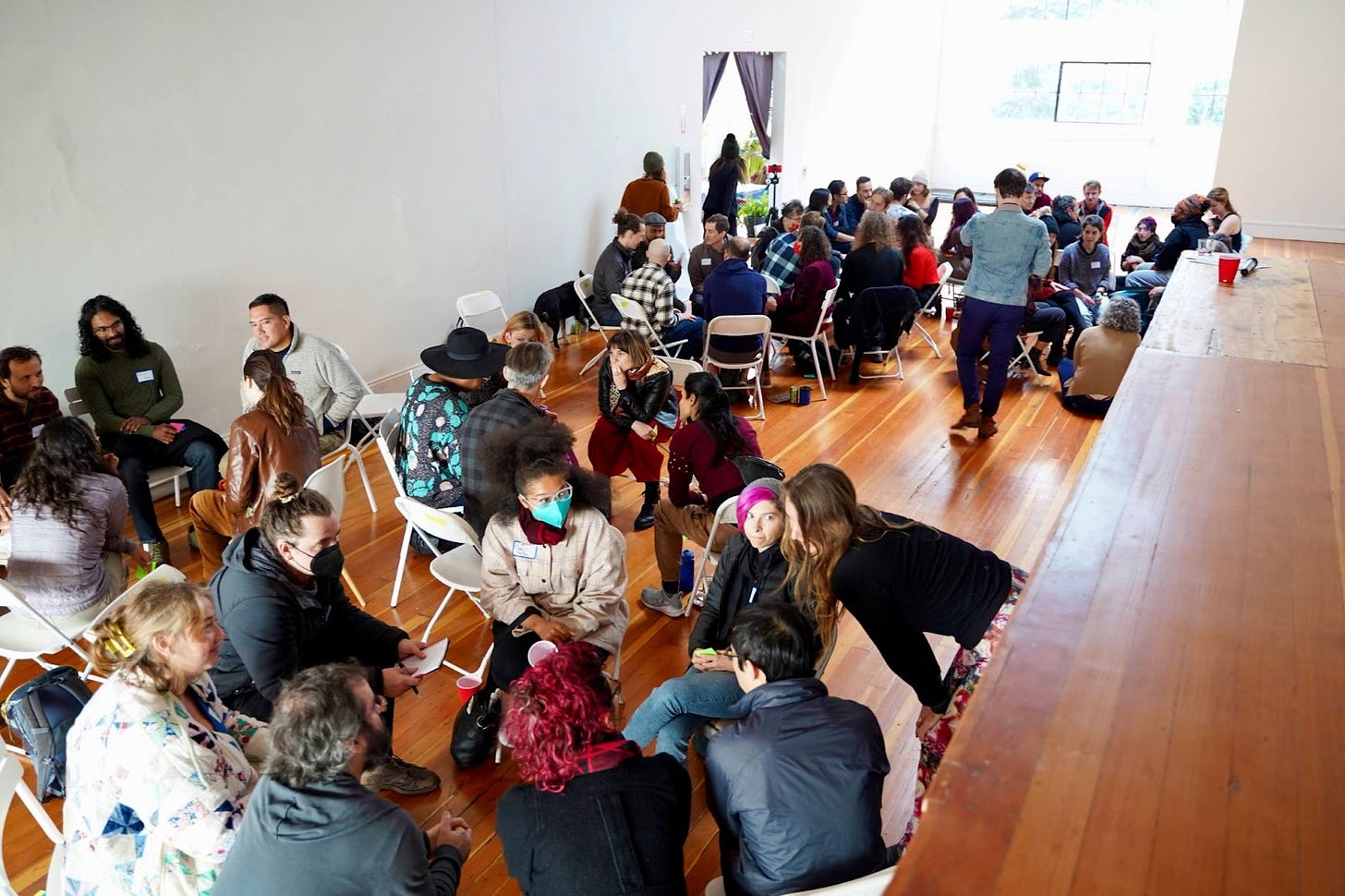
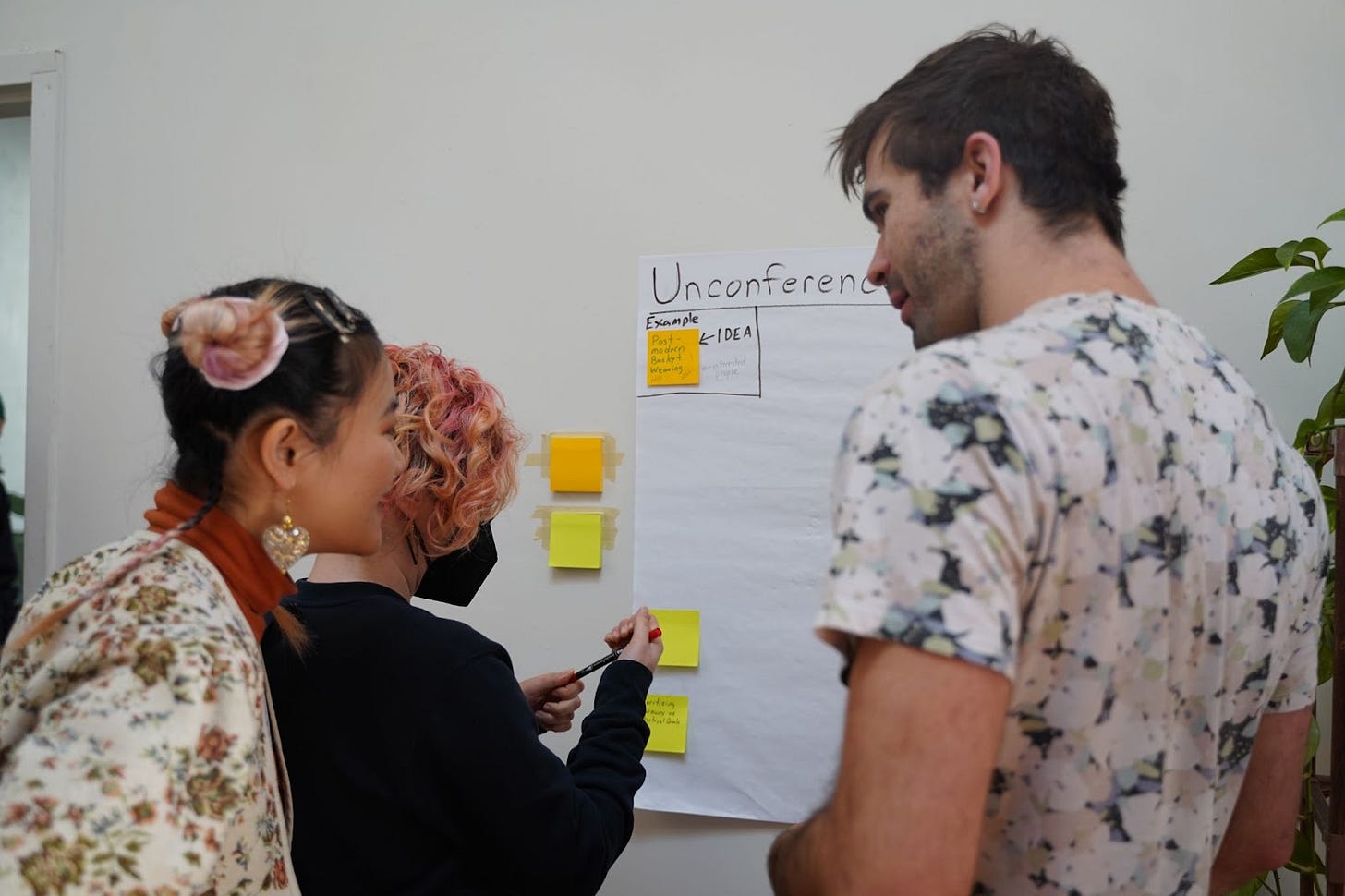


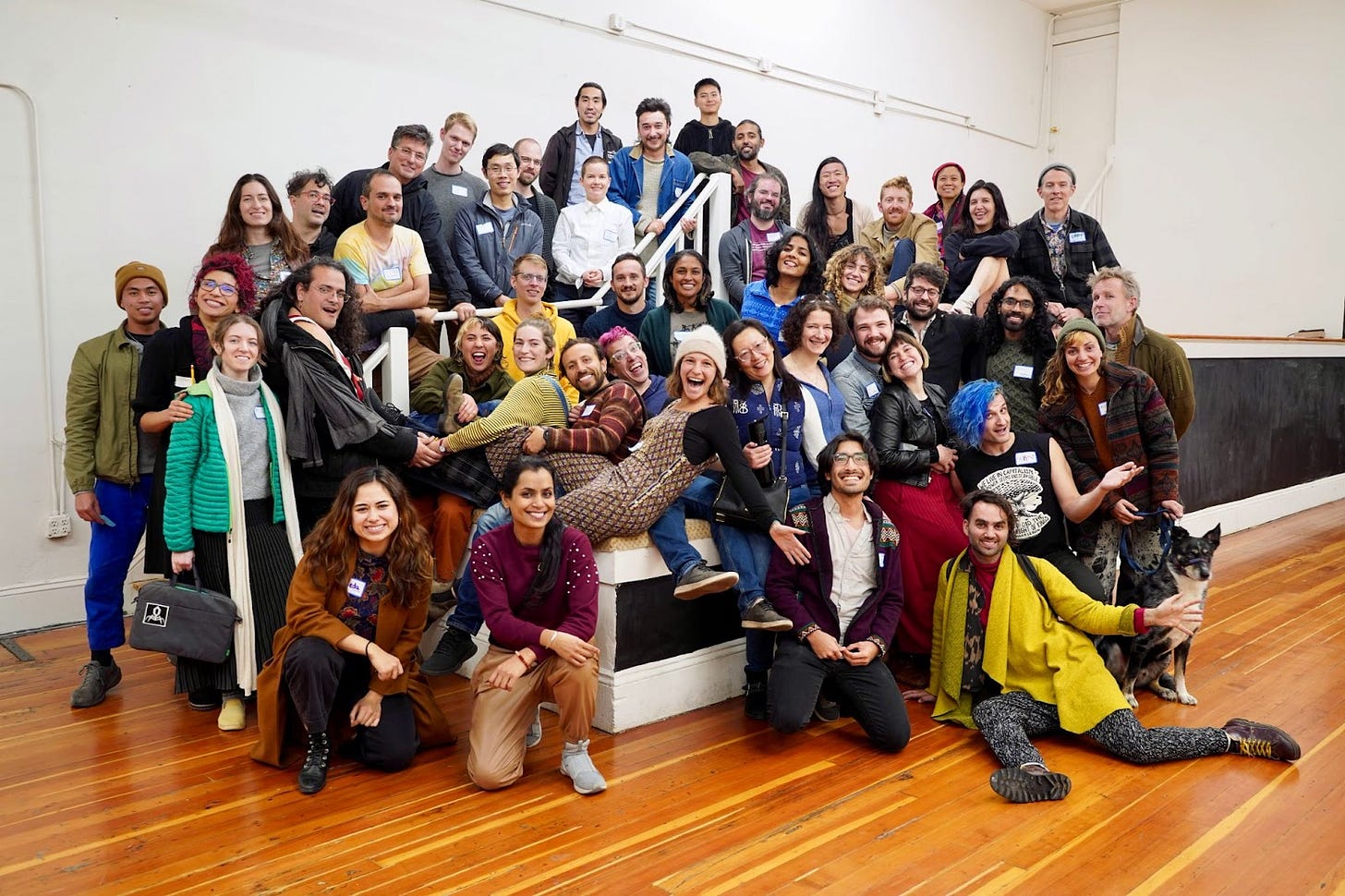

This makes me want to try community living already! Super impressive that this giant event with so many sections and speakers took only three months to execute. Sounds like it was a super fun and comfy day of learning and community building :)
This is so cool! What a wonderful space (I simply cannot wait for check out the garden sauna at the next event 🤭) I really enjoyed the graphics to complement what you were saying! You never cease to amaze me, Divs. This is amazing ♥️